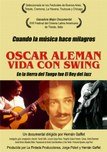Review of 'Vida con Swing' - 2

The fourth part of the documentary takes focus on the years of Oscar Alemán success as an artist and entertainer in his homeland, Argentina. The presentation of Alemán’s career during the 1940’ies and 1950’ies is well documented through spoken info and lengthy interviews with people having knowledge about the subject, former bandmates as well as historians, furthermore we are treated with filmed clippings from scrapbooks and a couple of scenes from movies featuring Oscar Alemán as an actor – the scoop beeing a dancing scene from the movie “El idololo del Tango” with a freewheeling rendition of “Improvisacion sobre Boogie Woogie” as soundtrack. As mentioned, the interviews are giving crucial info about Alemán’s career, also extending our knowledge on his personality as a professional performer. A sequence has an interview with renowned musicians, Walter Malosetti and Ricardo Pelican – shot at a moment when they are sitting with their instruments in hand. Unfortunately, they dare not touch their guitars during the interview about Alemán’s guitaristic skills as if this would be a dishonour towards the subject of the interview! Sadly, in this way the documentary tends to preserve the legacy of Alemán as a sacred relic left to custodes at a museum only!
The fith part of the documentary is about the decay of Alemán’s success as the most popular artist in Argentina during the 1950’ies. We learn about the dark side of his success, the personal costs including another broken marriage and problems with alchohol and health, the decline of his public success beeing a sad fact of his daily life in the 1960’ies when he would survive only by giving private lessons and a couple of public performances at humble places from time to time. The only bright moment of this dark period seems to be Alemán’s meeting with Duke Ellington in Buenos Aires 1968, when the band toured South America. This meeting is documented by interviews with Ellington’s Argentine tour-manager and has a very touching describing. Actually, this meeting would lead to the rediscovery of Alemán in Argentina and the remaining part of the documentary then sets focus on his secound career in his late years through the 1970’ies.
Once again the name of this great artist would be headlined in the public, but Alemán’s health was at a decay and his drinking habits caused the decease that lead to his passing away in 1980. In this last part of the documentary the spoken info stresses the symptons of Alemán’s bad health and thereby seems to feature him as an unbalanced individual left to his own fancies. This is especially underlined in the spoken info at the end of the film concerning Alemán’s fancy about having caused the suicide of both his father and his former friend and companion, Gaston Bueno Lobo. As a result of lack of documentation this viewer of the film is left with an impression of the main character as beeing mentally distorted at the end. Leaving this to the judgement of other viewers of the documentary, nonetheless I'll end this small review by requesting a consideration, if this branch of biography is to the benefit of the person portrayed and his legacy to the world?
Jo
If you want to be informed about all updates of this blog please use RSS Site Feed (information: side bar - contact)
 This weblog will give you information about the "El Redescubrimiento de Oscar Aleman" project, the "Rediscovering of Oscar Aleman" project.
Oscar Aleman ( 1909 - 1980 )was an Argentinean jazz guitar player, entertainer and showman, born in Argentina, lived in Europe (1930s)and returned to Argentina ( 1940 - 1980 ).
He was one of the best jazz guitar players of his time.
This weblog will give you information about the "El Redescubrimiento de Oscar Aleman" project, the "Rediscovering of Oscar Aleman" project.
Oscar Aleman ( 1909 - 1980 )was an Argentinean jazz guitar player, entertainer and showman, born in Argentina, lived in Europe (1930s)and returned to Argentina ( 1940 - 1980 ).
He was one of the best jazz guitar players of his time.


0 Comments:
Post a Comment
<< Home